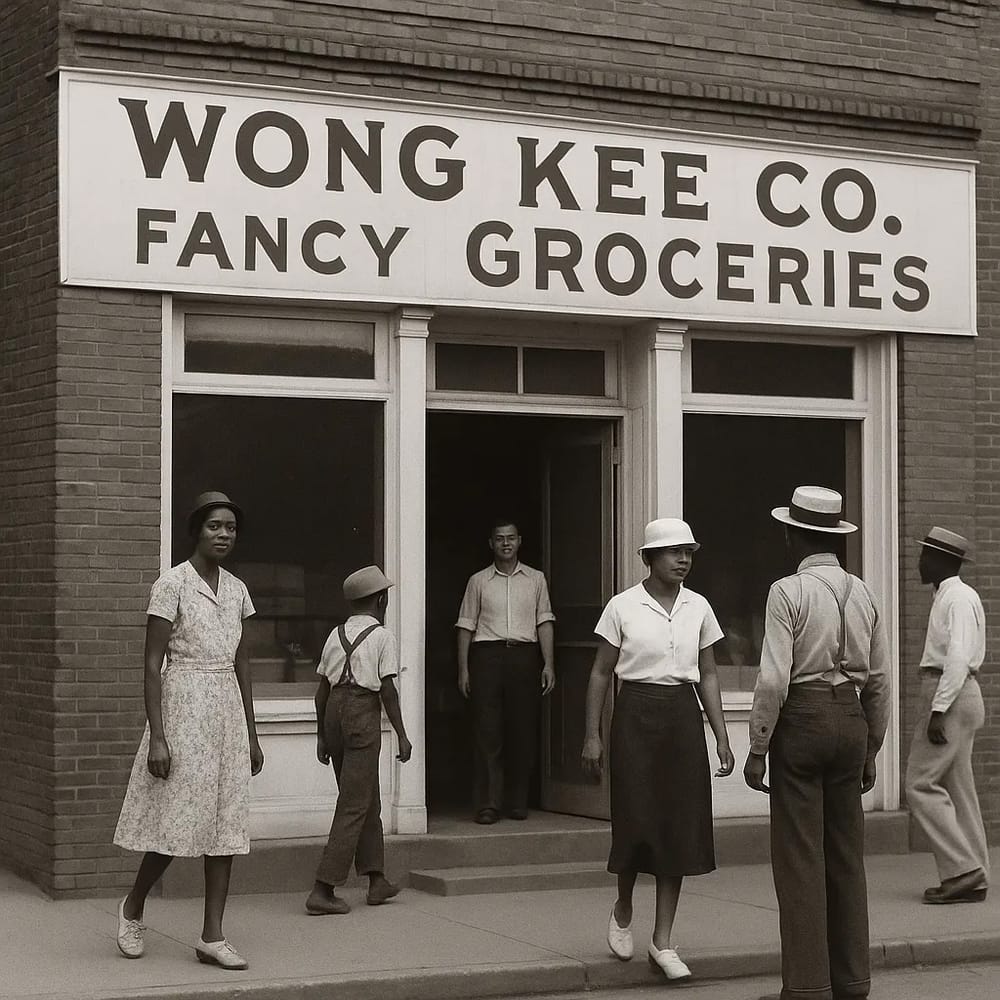Unless you’ve studied history closely, you may have been surprised to see a Chinese-owned grocery store in the Deep South serving Black customers during the Jim Crow era.
One friend who saw this scene in the movie, Sinners, and remarked , “That was random.”
It wasn’t random at all.
Black folks in the Mississippi Delta and throughout the South weren’t treated with dignity in 1932, the year Sinners takes place. Separate drinking fountains and schools. Laws that could get Black people arrested just for standing around laughing. False rape charges regularly charged against Black men. Legalized slavery as punishment for even petty offenses. And the Ku Klux Klan.
Needless to say, Black southerners were not welcome as equal citizens.
It was commonplace for white-owned businesses to refuse service to Black people.

But there was one part of southern society where the rules were different: Chinese-American–owned grocery stores.
Chinese-American grocers became critical to Black survival during Jim Crow.
While Chinese Americans themselves faced serious discrimination, it was not as severe as what Black Americans endured. Chinese merchants were allowed to purchase eggs, meat, vegetables, and other perishables from local farmers, along with most household supplies.
Even so, these grocers operated largely outside the white business world, other than purchasing some goods for resale. White customers had little interest in patronizing Asian-owned shops any more than they did Black-owned establishments.
As a result, Chinese-owned groceries became sanctuaries of dignity for Black southerners — places where they could buy food without harassment, where they might be greeted with a simple “good morning” or “thanks for shopping here.”
But the role of these stores didn’t stop there.
Chinese-American grocers often allowed their establishments to be used as community bulletin boards, where Black families could post notices about church events, school functions, or even missing relatives. Some stores opened their doors for meetings and gatherings. These shops weren’t just places of commerce — they became hubs of belonging.
While the exact number of these grocery stores is unknown, historians have documented evidence of 400–500 Chinese-owned groceries in the Mississippi Delta alone, in towns such as Greenville, Clarksdale, and Greenwood, as well as dozens more across Arkansas, Louisiana, Alabama, and Texas — in cities like Helena, New Orleans, and Pine Bluff.
Their origins trace back to the years following the Civil War, when white farm owners brought Chinese immigrants to replace freed Black laborers.
Confronted with racism and poor working conditions, many left the plantations. By the 1870s, families began opening small groceries that primarily served Black customers in segregated communities. By the 1920s and 1930s, Chinese-owned groceries were commonplace throughout the South.
By the 1960s, however, the rise of large grocery chains began squeezing out family-run shops. As second- and third-generation Chinese Americans pursued careers in medicine, law, and business, there was often no one left to take over the family store. One by one, the shops closed.
The history of Chinese-American grocery stores in the Deep South may have been short-lived, but it stands as a beautiful example of allyship in the face of systemic oppression — a reminder of what can happen when marginalized communities support one another.
This post originally appeared on Medium and is edited and republished with author's permission. Read more of Jeffrey Kass' work on Medium.
